Regional election in the Valencian Community, 28 May 2023

Nadia Khalil Tolosa
Professor at the International University of ValenciaIssue
Issue #4Auteurs
Nadia Khalil Tolosa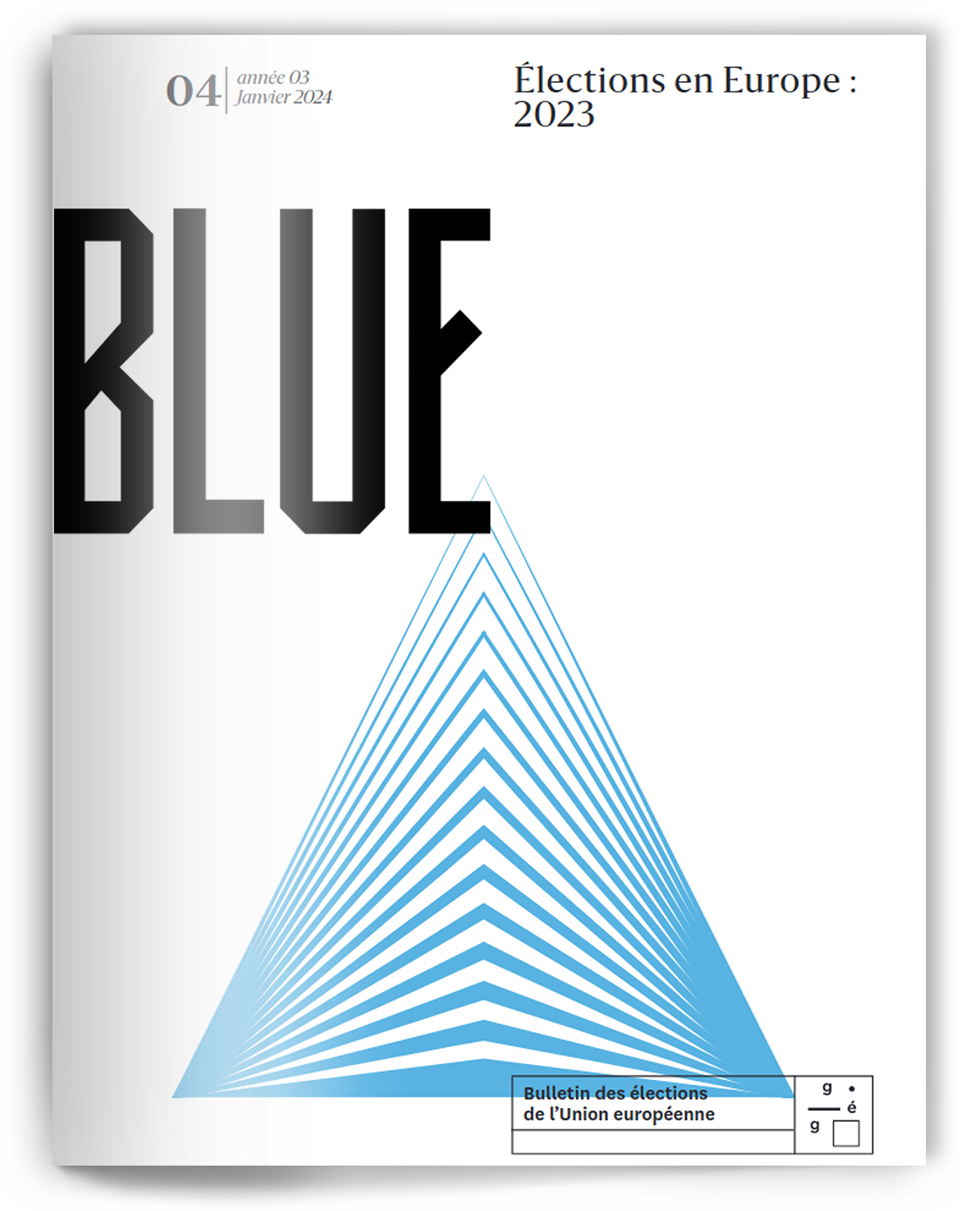
Issue 4, January 2024
Elections in Europe: 2023
Twelve of Spain’s seventeen autonomous communities held regional elections on Sunday, May 28, 2023. On that same day, municipal elections took place throughout the country. In this paper, we analyze the results of the election to the Cortes of the Valencian Community (the Valencian Parliament) and the formation of the government of the 9th autonomous legislature.
The fact that the Valencian campaign and election have been the subject of numerous analyses and conjectures is due, to a large extent, to the relevance of the region at the national level, as well as to the possibility that its results would significant impact the subsequent national elections, thus initiating a change of political cycle. For this reason, many analysts spoke of the community as “crown jewel,” seeing in the Valencian election one of the most significant electoral events in the run-up to the general election. Originally, the Spanish general election was expected to be held at the end of the year, and it was widely speculated that the party that would win in the Valencian Community would be able to replicate this success at the national level.
In all communities that voted on May 28, the results of the regional elections were very favorable to the conservative bloc formed by the Partido Popular and Vox. After the elections, the two parties managed to reach coalition agreements in four autonomous communities. This landslide victory of the conservative parties led the President of the National Government, Pedro Sánchez, to call early general elections for July 23, 2023.
The Valencian regional ballot has brought about significant changes in the Community. Firstly, the victory of the right-wing Partido Popular and Vox has put an end to a period of eight years of left-wing domination when the PSPV (the Valencian PSOE) had governed in a coalition with the regionalist party Compromís and left-wing Unides Podem (Unidas Podemos). Secondly, the Popular Party has regained power after two full terms in opposition, although it now has to share government responsibilities with the far-right Vox party. As a result, the PP governs in a coalition for the first time in the history of the Comunitat. Thirdly, both centrist Ciudadanos and left-wing Unides Podem have lost all of the seats they previously held in the Valencian parliament.
As shown in “the data,” the Valencian Parliament, les Corts, has 99 seats, in which the right-wing bloc outnumbers the progressive bloc with 53 seats. As usual, the regional election was organized simultaneously with the municipal elections, where a similar trend could be witnessed: the conservatives managed to seize many city councils from the socialists and their partners, including those of the provincial capitals of Valencia and Castellón; they also preserved their governing majority in Alicante.
Results
As can be seen in Figures a and b, turnout decreased by five percentage points with respect to the previous election, from 73.72% in 2019 to 68.71% in 2023.
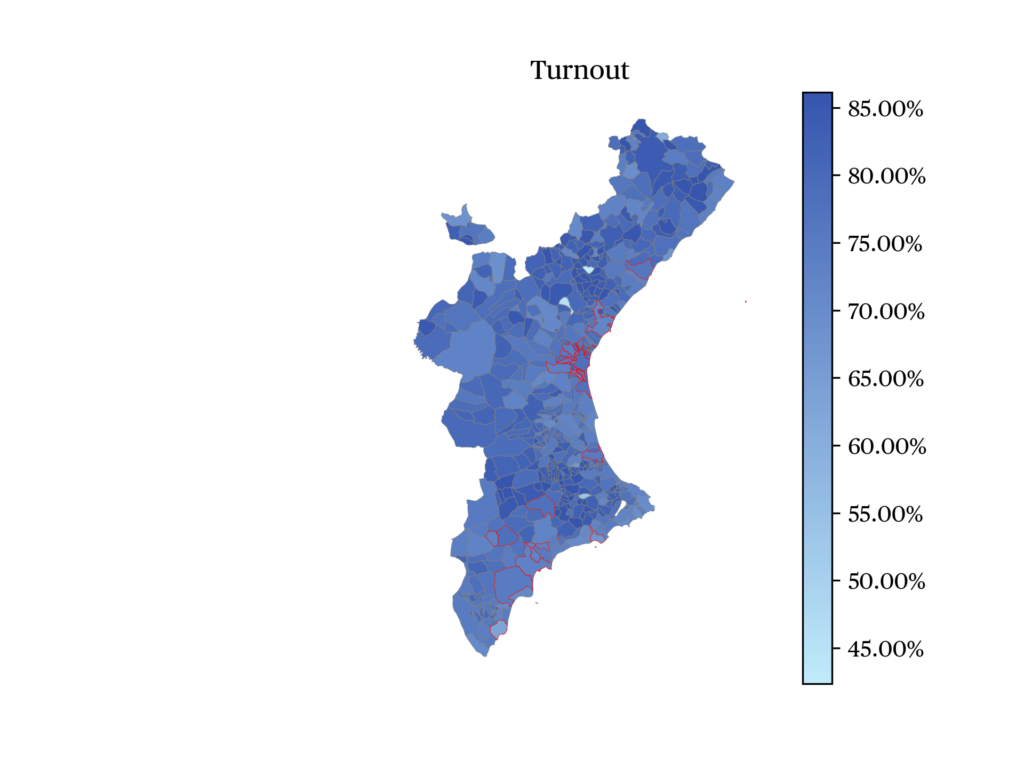
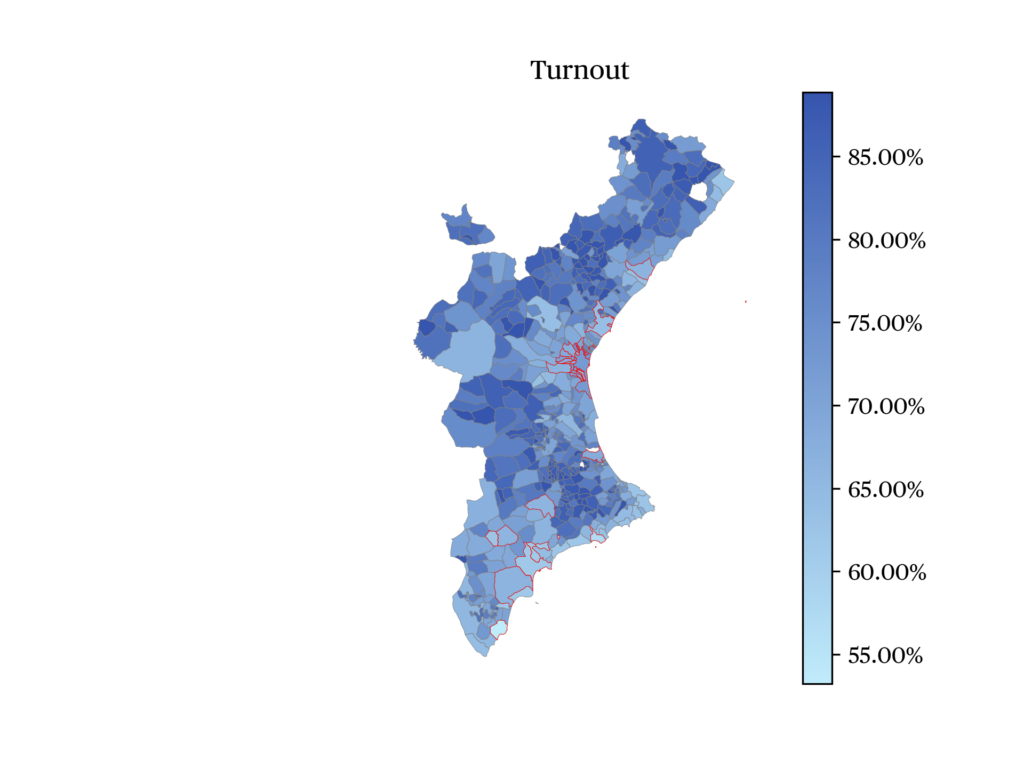
The most voted party was the Partido Popular (PP), which obtained 40 seats (+21), thus significantly improving its previous result. With 31 seats (+5), the Socialist Party (PSPV) also experienced an increase in its vote share. However, the PSPV’s five additional seats were not sufficient to allow it to form a new government with its two previous partners, since Compromís won only 15 seats (-2) while Podemos failed to reach the threshold needed to obtain seats in Parliament This allowed the PP to form a government with Vox, which, despite its losses (-3), could provide the ten seats that the PP needed in order to reach the parliamentary majority.
Given that no party achieved a seat majority on its own, a minority or coalition agreement was necessary to form a government. The PP and Vox eventually signed a coalition pact that granted a vice-presidency and three ministries to the far-right party.
It may seem paradoxical that despite the results strengthening the largest progressive party, which obtained more votes than in the 2015 and 2019 elections and won five additional seats, the bad performance of its coalition partners prevented it from forming a new government. This outcome however is less surprising when one observes that the increase in votes for the Socialists must have occurred, at least in part, at the expense of their previous government partners, whom the voters appear to have “punished”. Much worse than Compromís’ is the situation of Unides Podem, which reached 13 seats in 2015, dropped to eight in 2019 and obtained none in 2023. Another party of the so-called “new politics”, Ciudadanos, also failed to enter the regional parliament in 2023, losing all of the 18 seats it previously held. As can be seen from “the data”, both Podemos and Ciudadanos failed to meet the 5% electoral threshold, which is higher in Valencia than in other autonomous communities. The volatility of the vote appears to have benefited the PSPV and PP, although for the former the gain in votes has not been sufficient to secure a new term in government.
The results of Ciudadanos and Podemos have been equally disastrous in other communities. This follows a clear national trend that was confirmed in the July 2023 general election with the disappearance of Ciudadanos from the Congress and a significant loss of seats for Unidas Podemos, which ran as part of the Sumar coalition.
In the Comunitat Valenciana, the Partido Popular had governed for twenty consecutive years, from 1995 to 2015, holding an absolute majority in the Cortes during its last twelve years in office. As a result, the party has always governed alone, except during its first government term in 1995 when it had formed a coalition with the nationalist/regionalist party Unió Valenciana. In 2023, a narrow victory has now forced the PP to negociate a new agreement and govern in a coalition with the far-right party Vox, which thus entered the Consell (the Valencian government). The PP, which had registered its worst result in history in the 2019 election, this time managed to more than double its number of votes and seats.
For its part, the Valencian Socialist Party has been improving with respect to previous elections in terms of seats won. It obtained 23 seats in 2015, 27 in 2019 and 31 in 2023. However, this improvement was not sufficient to allow the party to remain in government.
As in previous elections, the results are very close, and both in the municipalities and in the regional government, the balance has tipped to the conservative side by a small amount of votes. In 2019, the difference between the left and right bloc was only 40,000 votes in favor of the left. This time the right has regained a majority by about 120,000 votes.
National impact of the vote
It is not easy to determine the weight that Spanish national politics had in the campaigns of the different communities, but there is no doubt that on some occasions it played a more substantial role than regional issues. In general, the victory of the conservative bloc, both in the Valencian Community and in the other regions, has been interpreted as a form of ‘punishment’ of the central government and, in particular, of Podemos. However, in the Valencian case, the polls and the votes show a rather positive assessment of the performance of the outgoing progressive Valencian government and the PSPV.
The predictions that had been made about the relevance of the Valencian election for Spanish national politics have not been completely fulfilled. The influence of the so-called “crown jewel” has been important, as usual, but not decisive. Both in the Valencian regional election and in the Spanish general election, the Popular Party has grown stronger and the Socialists have increased their vote share, while their partners have collapsed; however, unlike in the Valencian case, at the national level the right-wing bloc has not been able to govern by joining forces in a coalition.
It is worth underlining that the government agreement between the PP and Vox was concluded remarkably quickly. Despite the fact that the PP stated during the campaign that they would try to govern alone, the agreement took less time to be negociated than similar agreements between the two parties in other communities. The pact is rather generous towards Vox, which obtained a vice-presidency and the three ministries of Culture, Agriculture and Justice. While those ministries do not have the largest budgets, they have a high symbolic status (for example, the Ministry of Justice is in charge of issues related to male violence, whose existence Vox denies, and the Ministry of Culture is now headed by a supporter of bullfighting).
It is likely that this pact, like similar agreements in other communities, influenced the national elections of July 23 by encouraging left-wing voters to turn out to prevent a similar scenario at the national level. This leads us to suggest that the Valencian “crown jewel” may actually have been able to maintain its influence, although this time it may have worked as an example to be avoided rather than followed.
The end of the “new politics”?
It is remarkable that the parties of the so-called “new politics”, Ciudadanos and Unidas Podem, lost all of their seats in Parliament in this election. The two parties had first acquired representation in les Corts in 2015 and had obtained very good results since then; while they grew by taking votes away from the two main parties, the PP and PSPV, with the passage of time their vote share decreased again in favor of these same parties. Although pre-electoral polls predicted bad results for both formations, especially Ciudadanos, and despite similar trends in all other communities, the complete disappearance of Podemos has come as something of a surprise. As a result of the 2023 election, les Corts will be less fragmented in the next legislative term than in the previous two, with only four parties represented (PP, PSOE, Compromís, Vox) instead of six (PP, PSOE, Compromís, Vox, Podemos, Ciudadanos).
The data
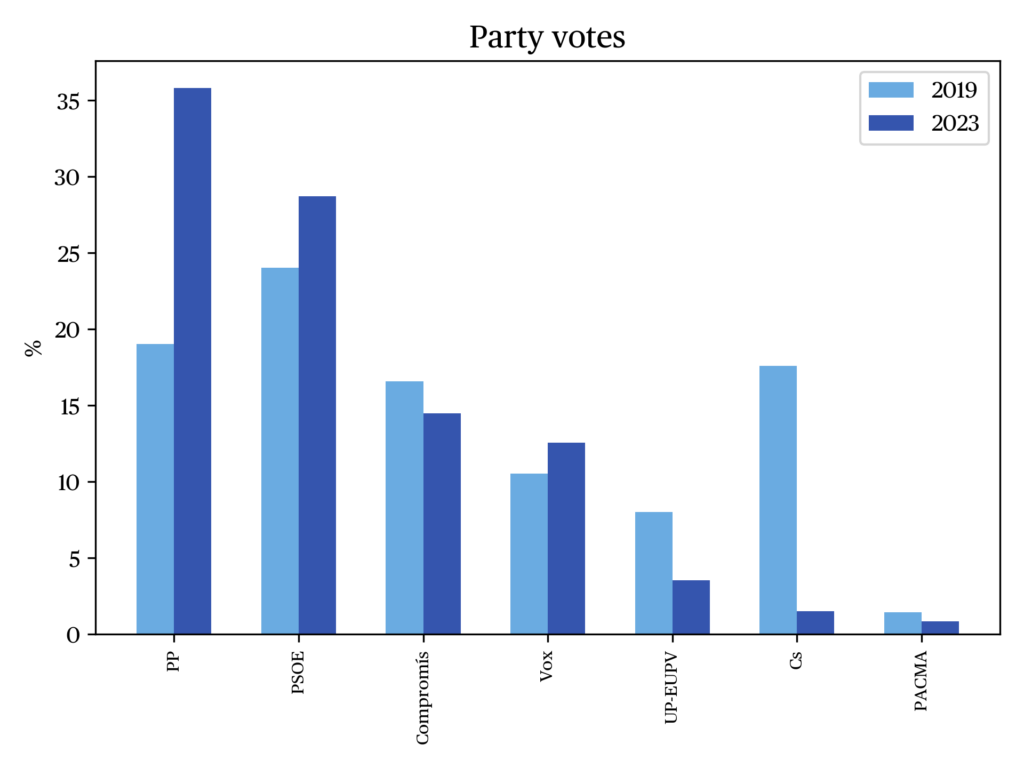
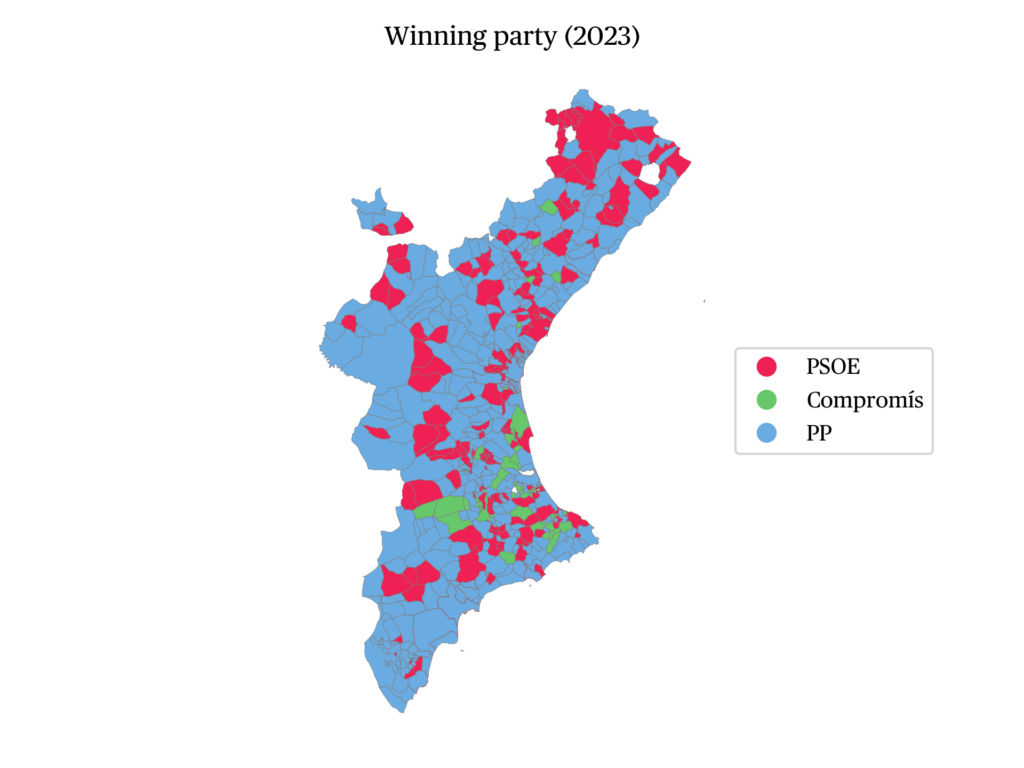
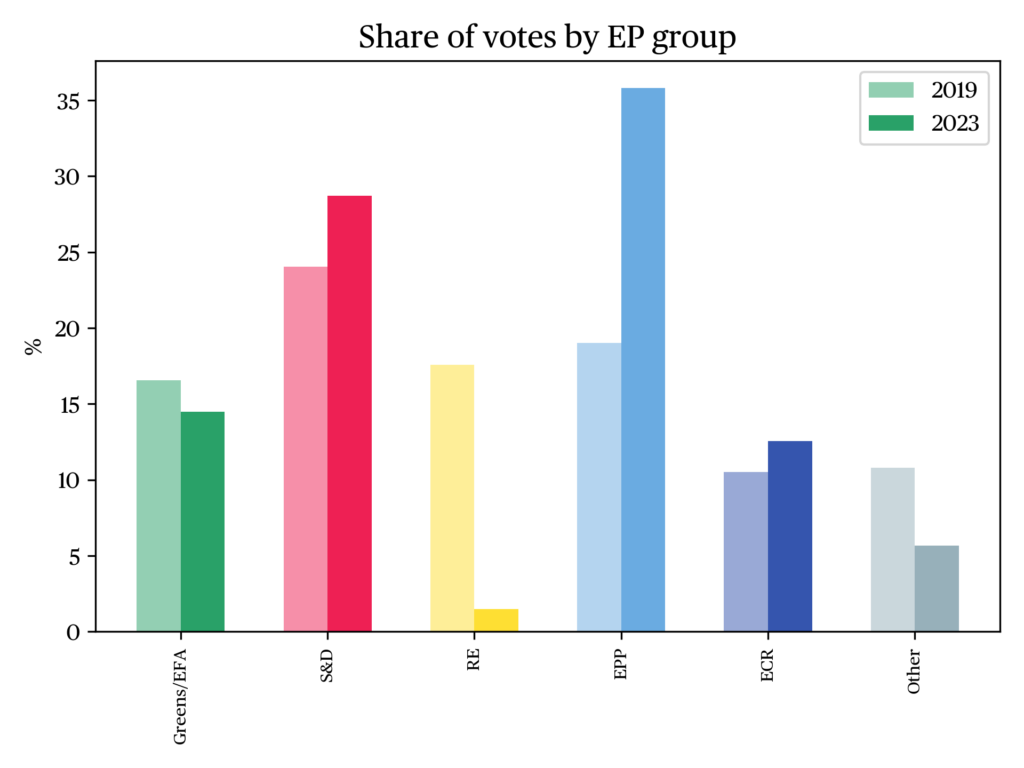
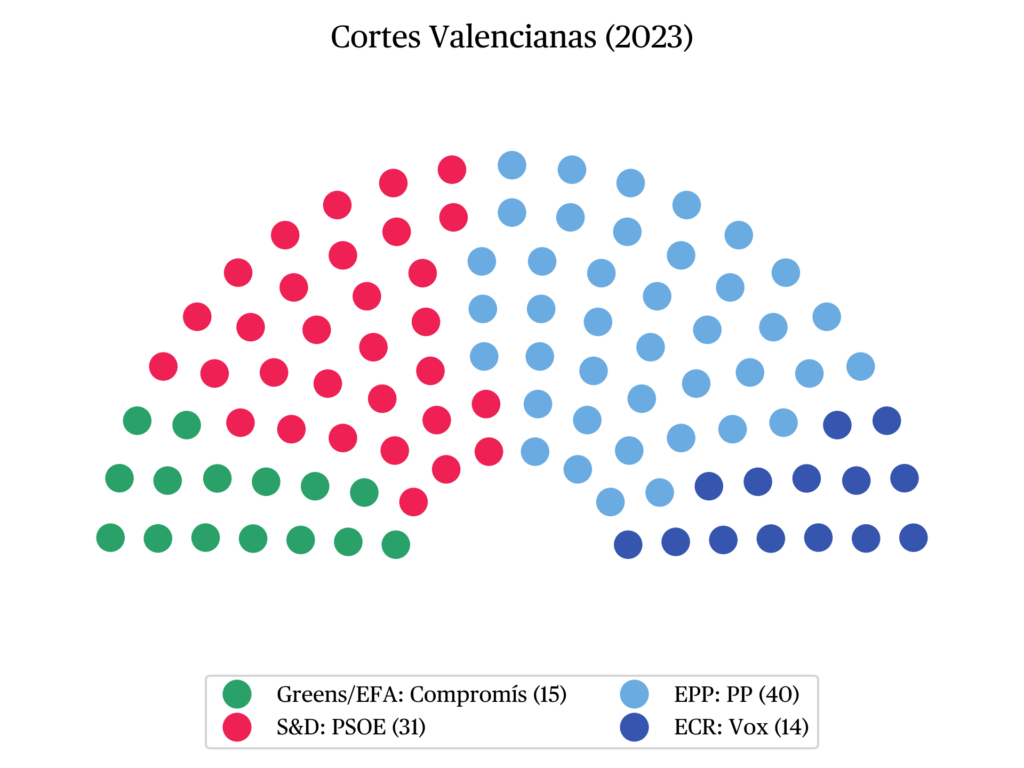
Yet, this change of political cycle does not mean a return to the “old days” of Spanish politics. To begin with, the fact that the Partido Popular is now forced to govern in a coalition with Vox represents, by all accounts, an unprecedented situation in the region. Of course, the notable disappearance from Parliament of the parties of the so-called “new politics” (Ciudadanos and Unides Podem) is evidence of a strengthening of bipartisanism, but it would be unfair to analyze this situation with the eyes of the past. This reduced fragmentation does not, for the time being, allow us to conclude that the two-party system is back.
citer l'article
Nadia Khalil Tolosa, Regional election in the Valencian Community, 28 May 2023, Jun 2024,
à lire dans cette issue
voir toute la revue





